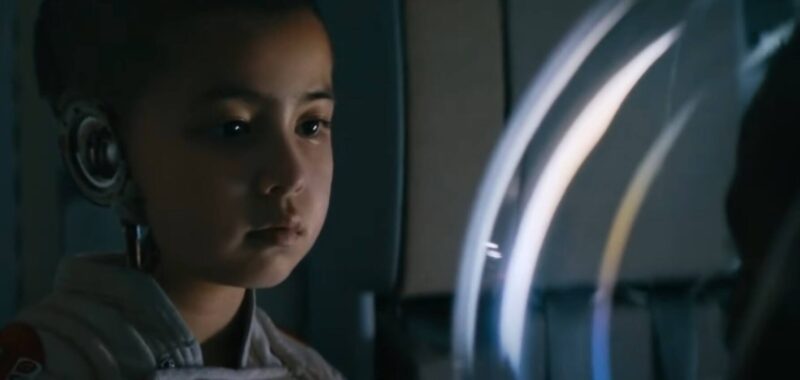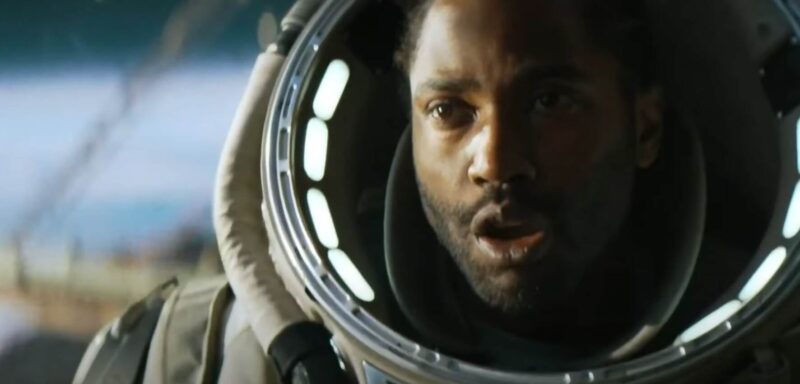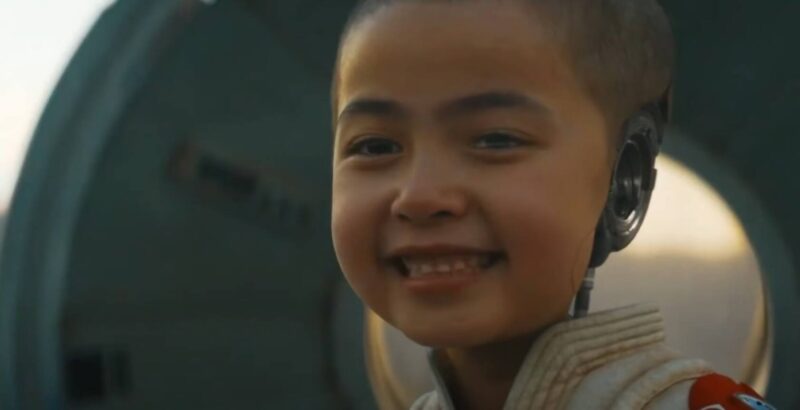
With spoilers, Jurassic World Rebirth director Gareth Edwards relates a charming anecdote about The Creator’s ending and how it was captured.
NB: This is your final warning for heavy spoilers for 2023’s The Creator.
Two years before this summer’s dinosaur sequel Jurassic World Rebirth, director Gareth Edwards made a visually dazzling sci-fi thriller: The Creator. After the franchise studio films of Godzilla and Rogue One: A Star Wars Story, it was a return to more personal filmmaking for Edwards – a futuristic piece that felt like a collision of Blade Runner and Apocalypse Now.
In an alternate reality, research into robotics and artificial intelligence exploded in the 1950s, leading to a late 20th century where mechanical workers were ubiquitous. But in 2055, society’s rocked by the explosion of a nuclear bomb over Los Angeles; AI is blamed for the disaster, and in response, robots are outlawed in western countries but find refuge in the far east.
Against this backdrop, embittered soldier Taylor (John David Washington) is sent on a mission in New Asia, where he’s tasked with tracking down and destroying a new AI weapon. What he finds is Alpha-O (newcomer Madeleine Yuna Voyles), a new kind of robot who looks and acts for all the world like an innocent child. Despite his own lingering anger towards anything connected to AI, Taylor becomes a father figure to the kid, whom he nicknames Alphie.
The Creator’s 2023 release also happened to coincide with the disquietingly fast roll-out of generative AI, turning the film’s premise – that the humans are the oppressors and the robots are a terrorised minority – into more of a current topic than Edwards could have envisioned when he co-wrote the script. Amid the director’s captivating location photography and seamless VFX, however, is a humanistic spark of warmth between its two leads.

It all builds to an explosive climax, in which Taylor rescues Alphie from the US military’s Death Star-like NOMAD flying base, sacrificing himself to send the kid to safety before the war machine explodes. By this point, Alphie’s ability to control electronic devices has fully matured, and the film ends with her being hailed as the Nirmata – essentially a messianic figure to New Asia’s AI population.
That ending has all kinds of implications: not least that Earth is about to be watched over by an all-powerful but benign female deity. “When we first cut that part of the film together,” Edwards said when we asked about The Creator’s ending, “I remember in the edit suite, some people would look at it and got scared by it. As in, ‘Are you trying to say that AI is going to take over?’”
Rather than being specifically about AI, however, Edwards says The Creator is more about human nature in general – how our capacity for cruelty and hatred is as dangerous to our existence as the technology we collectively invent.
“I’m trying to say that, with all of our differences, we’re going to find a way. Empathy and kindness will win. I feel like this child [Alphie] has this innocence. It doesn’t understand; it hasn’t learned to hate everything. That won out, in the end, against prejudice. That’s what the ending said to me.”

Read more: The Creator review | The best science fiction film of 2023

Suggested product
Film Stories issue 53 gift bundle: Magazine + Nic Cage scratch poster + Nic Cage coasters!
£30.00

For Edwards, that innocence is illustrated in the final shot of Alphie, having landed back on Earth, and smiling as she looks out at a sea of AI robots.
“I really love what Madeleine did on our film,” Edwards says. “She’s an amazing actress, and we actually shot that very last shot of the film in a quarry [where some earlier sequences were also filmed]. We knew this would be our last chance to get a shot of her against all these mountains. I think I did about 30 takes. I got really greedy, because she was brilliant, so I kept going and going. I know the whole film is hanging on this shot.”
Here, Edwards relates a sweet little anecdote about how he elicited the specific reaction he needed from the young actor, who was just seven years old during The Creator’s filming.
“I can let you in on this now, because the film’s come and gone,” he says. “But she does this beautiful laugh at the end, she’s like crying, and then this little giggle comes out, and then we cut. What happened was, I was really trying to get the right kind of emotion out of her, where she was sad but also really happy at the same time. I think I might have had a speaker or a microphone, but we basically told her, ‘The winner of the Oscar for Best Actress is… Madeleine! And the crew cheered her, and because I knew she wanted to be an actress when she got older, she just teared up at everybody applauding her.
“And then she knew she had to stay in character, and when it finally ended, and I shouted, ‘Reset,’ which is basically the camera going backwards to do the move again… as soon as I said ‘reset’, she giggled at how absurd this all was…
“We watched it with the sound down, so you don’t hear any of us being idiots on the microphone, and it was this beautiful little moment with her. All this spectrum of emotion. I was like, ‘Well, that’s the last shot of the movie, for sure.”

As for what Edwards thinks about the advent of generative AI, a topic constantly in headlines over the past couple of years, he’s cautiously optimistic.
“I get excited about these new tools that are coming out,” he says. “I think, ultimately, it’s going to liberate storytelling – but it’s going to be a bumpy ride on the way to that, I think.”
He also adds, however, that AI “needs a filter to guide it.”
“There’s a concrete limit at the moment of getting anything truly creative out of it,” he says of his experiences with ChatGPT. “It’s like rolling a dice and trying to get a sx. It feels like what Ai is doing is looking at all the dice rolls and going, ‘The average is three’ and you go, ‘No, I want a six.’ That’s the genius thing we’re looking for. But it’s not got all the emotions we’ve got, hasn’t got the taste or the feelings we have about things. It doesn’t know what’s good or bad. So you can’t take the human equation out of it.
“But it’s hard to tell. I mean, we do end up as a [species] walking off cliffs without stopping ourselves quite often. So I’d say we’ve got to keep our eye on it. But if it’s a tool like a camera or a computer… I remember hearing that journalists were banned from using word processing when it came out. It’s comical to hear that today. There was a fear that was going to replace everything. So yeah, I think it all works itself out in the end.”
Jurassic World Rebirth is in cinemas now.
—Thank you for visiting! If you’d like to support our attempts to make a non-clickbaity movie website:
Follow Film Stories on Twitter here, and on Facebook here.
Buy our Film Stories and Film Junior print magazines here.
Become a Patron here.






